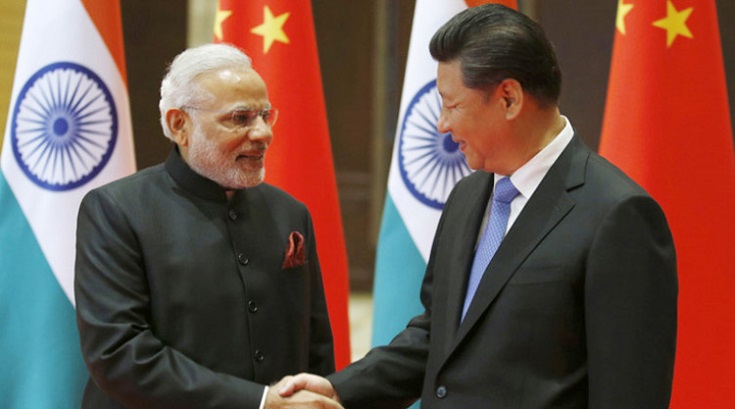The fundamental influence of Sino-Indian relations, which are constantly under surveillance of NEO, can hardly be doubted, not only on the situation in Indo-Pacific Regions (IPR), but also in the world as a whole.
A month earlier, it was difficult to disagree with the opinion of the experts that 2017 was marked as a worst (over many years) state in these relations. Due to the conflict on the Doklam plateau in the Himalayas, the situation almost resulted in a direct military confrontation between the two Asian giants. Moreover, conducting a regularly scheduled summit of BRICS members was on the verge of failure.
However, on the eve of the New Year, the same experts expressed discreet optimism on the future of the Sino-India relations in 2018. Alas, but international politics has nothing in common with the Christmas tales, and the pattern of the first few weeks of the New Year affirms it.
On 15 January, commenting on the same confrontation fact on the Doklam plateau, Director of the department of South Asia in Shanghai Academy of International Studies (one of the most reputed Chinese think tanks) Zhao Gancheng said that this conflict “has damaged the mutual trust and confidence in the both diplomacy and defense as well”.
In the article with remarkable title “China should prepare for more India border clashes” of the mentioned expert it is mentioned that “some high-ranking Indian officials showing hostility and consider China as a major threat” to India.
Furthermore, in the text of the article, the nameless “officials” indicates to Indian Army General Bipin Rawat, who has indeed made a number of strong statements regarding Sino-Indian relations in general as well as the situation on the border separating the two countries since his appointment to the current position at the end of 2016.
While often appearing in the Indian media news, General Bipin Rawat broadly manifested himself as a significant public politician. Thus, on January 12, he expressed his concerns over the imminent threats of the use of chemical, biological, radiological and nuclear weapons. Furthermore, he also emphasized, “China is a powerful nation, but we are not weak either”.
In the same Global Times, the rhetoric of the Supreme Commander of Indian Army were described as “hawkish” and contrary to the spirit of the agreements reached between the leaders of the People’s Republic of China and India during the BRICS summit which was held at the beginning of September 2017 in China’s Xiamen Island.
However, Chinese experts questioned the relevance of the reality of the statements made by the Indian senior officer about the power of Indian army.
Nonetheless, China has drawn attention to the message of leading Indian newspapers about the plans of Ministry of Internal Affairs to raise an additional 15 battalions, primarily, the border security forces. Of them, 9 battalions will join the forces controlling Indo-Chinese border near Tibet (Indo-Tibetan Border Police). The other 6 battalions will be directed to the border with Bangladesh and Pakistan.
Particularly alarming is the situation in the so-called “Line of Control” (LoC), separating the Indian state of Jammu and Kashmir from Pakistan. In 2017, there was sharp increase (compared to 2016) in the number of different armed incidents in the LoC. This negative tendency continued in beginning of 2018. There have already been several cross-border shootings and during one of them, soldiers and officers were killed from both sides.
Recalling last year, General Bipin Rawat united a situation evolving on the border of India with China and Pakistan in one problem, underlining the need for Indian army to be ready to wage war on two fronts.”
It is necessary to mention that the entangled complex of relationship between the two Asian giants is not of course limited to dangerous incidents in the border areas, which we may include the Indo-Pakistan LoC to as well.
However, these incidents, as well as the general issues of military- political rivalry between China and India come to the forefront when it comes to the main tendencies in the development of the situation in the Indo-Pacific Regions which is alarming.
Ultimately, one cannot ignore the question, what all the above stated could mean for Russia? To find the answer, the article “Unsentimental ties: India and Russia must focus on realistic cooperation managing the inevitable differences” is worth paying attention to.”
Its author, C. Raja Mohan is an editor of foreign policy of a popular newspaper “Indian Express”, the head of the Indian branch of the Carnegie Centre, a teacher of many (including foreign) universities which means he is a highly qualified and reputed expert. Therefore, his article deserves not narration, but perusal.
Here, we shall confine ourselves to the expression of agreement with its major points that are adequately summarised in the title. Just a few concomitant remarks concerning the Russian foreign policy in the region:
First of all, it is necessary to get rid of any traces of illusions (if they still exist) of the beginning of the last decade about the probability to create something similar to the Triple Alliance of “Russia-China- India” of anti-American orientation.
Secondly, in order to look for the causes of the problems (as the fundamental plan appears to be) in the relations between the two major foreign partners of the Russian Federation, there is no necessity for “proliferation of essences” by attracting factors of “foreign (“American”) intrigues”. It is quite enough having own, i.e. “Internal reasons” accumulated in tandem “China and India”. Of course to be precise, not a single international conflict situation bypasses without the presence of foreign “well-wishers”.
Thirdly, it is difficult to hold a debate on the topic of optimal policies regarding the extremely complex bonding of “China and India” lacking the clear objectives of internal and external aspects of the functioning of the Russian state itself.
Vladimir Terekhov, expert on the issues of the Asia-Pacific region, exclusively for the online magazine “New Eastern Outlook.”

